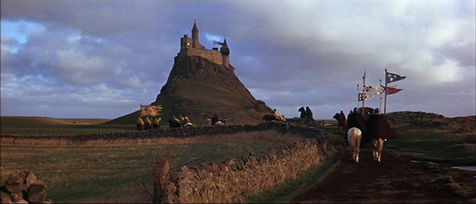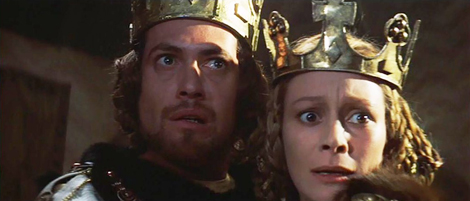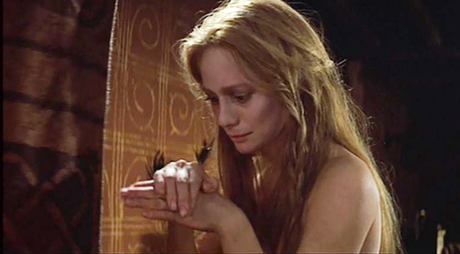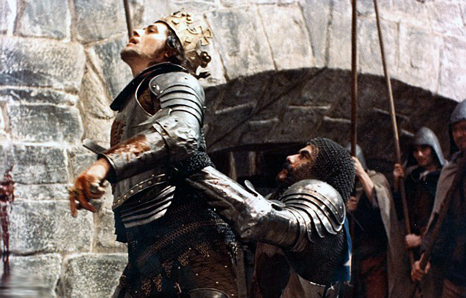Reviewed by Glenn Erickson
One sometimes forgets just how impressive Roman Polanski's movies can be. The old DVD of his 1971 Macbeth wasn't particularly good-looking, but it allowed us to see Polanski's superior direction in its proper widescreen shape. The new Criterion Blu-ray restores the appearance of this daring Shakespeare adaptation, bringing it up to near the top of his achievements.
'71 was the year of 'shocking' mainstream movies. After what had happened to Bosley Crowther with Bonnie and Clyde, critics were slow to dismiss two transgressive but trendy new pictures, A Clockwork Orange and Straw Dogs. Both were by controversial directors, and both were extreme and challenging. But the critics didn't have all that much to say about Roman Polanski's Macbeth, except to complain that he had added unnecessary violence into the play, and gone out of his way to make it as unpleasant as possible. Polanski's public image was still associated with the Manson murders, as if his 'demonic' movies like Rosemary's Baby somehow made him responsible for his wife's death. Macbeth didn't do well in the States but soon became a staple in Shakespeare film festivals. Frankly, as a film, it's probably the best Shakespeare adaptation ever.
A thousand years ago, Scotland is collection of brutal fiefdoms. After helping to put down a rebellion, Macbeth (Jon Finch) is rewarded by good king Duncan (Nicholas Selby) with another high rank. But after a cackle of witches forecasts his rapid rise to the crown, Macbeth and his scheming wife (Francesca Annis) plot and execute Duncan's murder. The dead king's immediate heirs flee to England under a cloud of suspicion, and Macbeth is named the new king. But even as they start down the path of killing, the ambitious couple is haunted by with strange visions and hallucinations.

Macbeth was bankrolled by Hugh Hefner's new Playboy Productions, an association that made it a ready critical target. Scoring points was all too easy when the moviemakers were the leading sexist vulgarian and a director 'obsessed by devil cults'. The adaptation was by Kenneth Tynan , a Shakespeare authority who also wrote radical counterculture plays. "Lady Macbeth walks around in the nude", was about all one heard, as if Polanski had tried to turn Shakespeare into Oh Calcutta!. Theater critics normally enjoy debating creative alterations and edits done to the famous texts. In film, even Laurence Olivier was clobbered for daring to cut scenes from his 1948 Hamlet. Orson Welles? His 1948 Macbeth isn't considered his best work, but it's still an impressive experience. Welles was always considered untouchable-crazy, so the radical re-shapings in his movie versions were indulged or praised as inspired creativity.
Not so Roman Polanski. Bloody mayhem takes place offstage in practically every scene, and Polanski simply brings it front and center. After a battle he shows wounded, bloody men. There's a party, so we see a cruel bear-baiting scene, also very bloody. The fights (excellently arranged by William Hobbs) really look like people are hacking each other to bits. The concluding Macbeth-Macduff dust-up is one of the best sword fights committed to film. The heavy swords and armor don't allow for any Errol Flynn- style acrobatics, so the combat involves a great deal of bashing about. It's more a test of stamina than anything else. At one point Macduff (Terence Bayler) improvises with a log off a log pile.
Polanski's often hand-held camera tracks through the narrow corridors and ramparts better than a Steadicam; he makes bravura shots look easy, combining complex moves with precise lighting changes. He does invisible objective-subjective shifts of POV as the camera swoops to peer through leaded windows of the castle set -- revealing a real castle exterior and horizon beyond.

Directorially, Macbeth is the best movie of its year. Polanski blocks his action with unerring perfection. In a Playboy interview, Polanski said that he never used more than one camera. At any given moment, he explained, there's only one place the camera wants to be. Nobody, like, nobody knows better where to put the camera than Roman.
Macbeth also shows a complete command of special effects. The floating dagger and the ghostly appearance of the dead Duncan are startling stage illusions, simply achieved. The dream sequences are masterpieces. The most astounding one plunges the camera at breakneck speed through a series of mirrors, recording a catalog of horrors. We're too astounded to even think about how it was done. In this new Blu-ray I can see a couple of shots that appear to use front projection. Polanski apparently needed a couple more angles of marching soldiers, and got them on a stage by placing new 'foreground' marchers over angles just seen before.
Macbeth gives us a very non- Brigadoon view of Scotland. The grim land is a place of mud, mire, rain and misery. The hills and lochs are visible in some shots, but we mostly see a blasted landscape of scrub and lonely beaches. The castles are enormous and intimidating. At court, the only luxury to be had is due to the labor of an army of woe-begotten servants. The assembled knights and retainers cluster around the VIPs, always aware of where the power lies. Later own, Macbeth's last allies stand about like thugs, deciding whether or not to back him. Yet there's a moment of formal triumph just before the call is given to storm Macbeth's castle. The caped knights stand in rows, looking very much like the rigid formations in Fritz Lang's The Nibelungen.
MacBeth is about horror: supernatural predictions, mass killings, and the hateful arrogance of the ambitious. The intimate conspiracies in the Macbeth bedroom are tense and joyless -- the murderous couple resembles a pair of Yuppies plotting their marriage-career. Horrid hag-witches encourage the evil doings, but this reading of Macbeth places ultimate blame on the blackness of the human heart, nothing more.

One masterful Polanski move is to partially internalize some of the soliloquies - Macbeth's 'Time' speech is half-spoken, half-rendered in the voiceover of Macbeth's thoughts, and has a tremendous impact. One of the more noted additions to the tale is a coda in which Malcolm's passed-over brother makes his own visit to the witches. At first it seems like yet another Polanski downer that ends the show on the darkest possible note. Kenneth Tynan went on record defending his and Polanski's alterations to the play, to little effect.
Macbeth is blessed with perfect casting. Jon Finch and Francesca Annis make an excellent pair of youthful ghouls, riffing nicely off Zeffirelli's 'youthful' casting for Romeo and Juliet a few years before. Finch is remembered much more for his unpleasant hero in Alfred Hitchcock's Frenzy. But he's at his best here, as a brooding monster whose martial prowess is enhanced by delusions of invulnerability.
Francesca Annis' interpretation of Lady Macbeth was highly criticized for its lack of bombast, but her hushed scheming is very convincing. Where her husband is deluded by evil dreams, Lady Macbeth comes off as a psychopath eager to inspire all number of horrid deeds but incapable of coping with the consequences of any of them. This film's 'hand washing' scene doesn't go over the top. As in Double Indemnity, a shared crime doesn't draw the killer couple together. As his wife becomes more deranged, Macbeth also drifts into morbid isolation. Her suicide is powerful because it expresses the blatant negativity of evil deeds coming home to roost. She's the queen, yet when her body is found broken in the mud, they just toss a blanket over her and walk away.
The rest of the casting is equally impressive. Terence Bayler is affecting as the warrior who's told of the death of his whole family, repeatedly asking if it's true that none were spared. Nicholas Selby's king is such a paternal figure that we experience a real loss of security when he's taken away. Martin Shaw as Banquo and Keith Chegwin as Fleance are an idealized pair, the perfect father and son and tragic victims of a man they both love. Polanski's witches are such a slimy & obscene lot, we wish that Matthew Hopkins were around to start some bonfires. The supernatural element is not ignored, yet in this version their effect on Macbeth is psychological. People will still believe that evil magic is responsible.

Macbeth isn't for the weak of heart. The reviewers couldn't get past the fact that, two years after the most lurid and bizarre crime of the century, Polanski seemed to be wallowing in gore. There is some truth behind that assessment. The 'home invasion' rape and slaughter of the Macduff household plays as a creepy shadow of the Tate killing, complete with bloodied, murdered children.
Picture for picture, from 1962's Knife in the Water through 1979's Tess, Roman Polanski made more superlative movies than anyone working anywhere. A Clockwork Orange is hip and Straw Dogs thrilled the rah-rah violence crowd, but Macbeth was hard work for the average viewer. Conservatives and the shrinking older audience skipped all of these scandalous pictures and went to Nicholas and Alexandra instead -- and promptly fell asleep.
The Criterion Collection's Blu-ray of Macbeth is a huge improvement over Columbia/TriStar's DVD from 2002. Back then the entire first reel of original negative was missing, so the movie opened with a dark and grainy image and a scratch running through half the titles. The new transfer was done in 4K. The added sharpness makes us marvel at Wilfrid Shingleton's impressive sets. The film was shot on several locations and on sound stages in London; the camerawork, direction and matching are so perfect as to make us believe it's all happening in one place.
The extras give us several perspectives on this once-controversial film. Polanski Meets Macbeth is 1971 promotional piece that features on-set filming. Screenwriter Kenneth Tynan appears with Dick Cavett, and Polanski is a guest on a 1972 British TV show, with stage director Peter Coe. When tasked to explain the theme of the play Macbeth, Coe stammers out some academic thoughts. Roman cagily answers, "I haven't a clue."
The new item is Toil and Trouble: Making Macbeth, an absorbing interview piece with Polanski, producers Andrew Braunsberg & Victor Lownes, and actors Francesca Annis and Martin Shaw. It's full of revelations big and small, and Polanski is candid and open in his observations.
A stunning trailer is included, along with a teaser that announces the refurbishing of Hefner's New York Playboy Theater, where the film premiered. A folding insert contains one text essay, from film critic Terrence Rafferty.
On a scale of Excellent, Good, Fair, and Poor,
Macbeth Blu-ray
rates:
Movie: Excellent +
Video: Excellent
Sound: Excellent
Supplements: Longform interview docu Toil and Trouble: Making Macbeth with Polanski, producers Andrew Braunsberg snf Victor Lownes, actors Francesca Annis and Martin Shaw; 1971 behind-the-scenes featurette docu, TV interviews with Tynan and Polanski; trailers, insert essay by Terrence Rafferty (see above).
Deaf and Hearing-impaired Friendly?
YES; Subtitles: English
Packaging: Keep case
Reviewed: September 13, 2014

Text © Copyright 2014 Glenn Erickson
See more exclusive reviews on the Savant Main Page.
The version of this review on the Savant main site has additional images, footnotes and credits information, and may be updated and annotated with reader input and graphics.
Return to Top of Page
|

